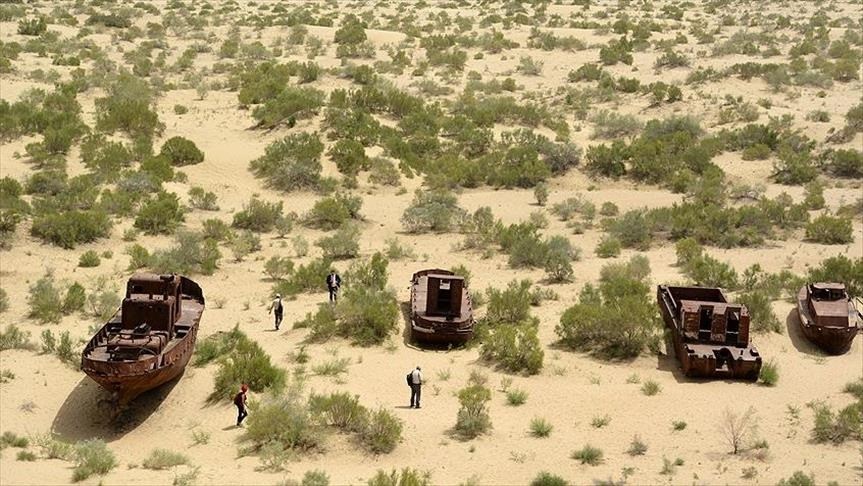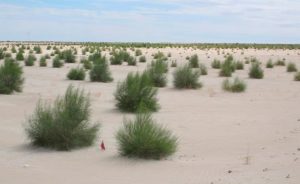Promoted by the Embassy of Uzbekistan in Brussels. The views belong to the sponsor.
Recently it became known that the G20 Leaders set the ambitious goal to plant 1 trillion trees on the territory of the most degraded ecosystems in the planet by 2030. In this regard, CERR expert Muhammad Babadjanov suggests that 50 developed countries of the world plant high-tech and innovative forests with an area of 5 hectares on the territory of the dried Aral Sea in Muynak, and each of these forests should be named after the countries that supported this initiative.
Role of trees in the Earth's ecosystem
As you know, trees play an important role in the ecosystem of our planet, they absorb carbon dioxide and release oxygen, maintaining a healthy environment. Trees help keep air and water clean, and forests are home to many animals and plants. Since the twentieth century, humanity has begun to seriously feel the role and value of trees in the existence of nature and this is especially true given the impact of deforestation on all continents of the globe. Unfortunately, trees and plants all over the world are being burned, degraded and cut down at a high rate and according to some estimates, 46% of the world's forests have already been destroyed.
Deforestation affects people and animals not only where trees are cut down, but the whole world as well. 80% of the Earth's land animals and plants live in forests, and deforestation threatens many of the animal species that live there. The disappearance of forests through direct and indirect human influence without sufficient reforestation has adversely affected the bio-sequestration of atmospheric carbon dioxide, along with habitat damage, loss of biodiversity and aridity.
The global community on the path to reforestation
All over the world, people are seriously concerned about deforestation and its consequences. In this regard, comprehensive measures are being taken on a global scale to preserve and restore the ecosystem of our planet.
On June 4, 2021, UN Secretary General Antonio Guterres announced the start of the UN Decade for Ecosystem Restoration 2021-2030. The goal of this initiative is to promote global collaboration between national governments, the private sector, non-governmental organizations and ordinary citizens to restore degraded and destroyed ecosystems. Under this initiative, the World Bank is leading a task force in charge of finance that:
- provides guidance on reorienting ecosystem restoration subsidies accordingly;
- will oppose economic forces and vested interests that lead to the degradation of ecosystems;
- will encourage government and corporate investors to jointly invest in ecosystem restoration, including in areas where the benefits of restoration are predominantly public goods.
Moreover, as part of this initiative, FAO has created a task force working with more than 43 organizations to develop guidelines and benchmarking best practices for the restoration of ecosystems and indigenous knowledge around the world. Its work focuses on spreading knowledge of recovery techniques over the next ten years.
In addition, in 2020, the World Economic Forum launched the One Trillion Tree initiative as a platform for governments, businesses and civil society. This is a project launched by Plant-for-the-Planet to plant one trillion trees worldwide and is a continuation of the earlier Billion Tree Campaign initiated by Wangari Maathai. As of May 30, 2021, within the framework of this campaign 13.96 billion trees has planted worldwide.
According to the final declaration of the summit held in Rome on October 30-31, 2021, the G20 Leaders have set the goal to plant 1 trillion trees on the planet by 2030. “Acknowledging the urgency of combating land degradation and creating new carbon sinks, we share the aspirational goal to collectively plant 1 trillion trees, focusing on the most degraded ecosystems in the planet, and urge other countries to join forces with the G20 to reach this global goal by 2030, including through climate projects, with the involvement of the private sector and civil society” the document says.
The ecological disaster of the Aral Sea
Today it is not a secret for anyone that the process of drying up of the Aral Sea entailed a large-scale ecological catastrophe, the disastrous consequences of which were primarily felt throughout the Aral Sea region. The dried-up part of the Aral Sea has become the source of pollution of the atmosphere with dust and salt, which for decades fly through the air for many thousands of kilometers, causing damage to flora and fauna.
To minimize the negative consequences of the Aral ecological catastrophe, the Government of Uzbekistan is taking comprehensive measures, including the formation of a new soil cover at the bottom of the dried sea, where the salt desert is located, minimizing environmental damage to the health of the population of the Aral Sea region and revitalizing their socio-economic life.
At the suggestion of the President of the Republic of Uzbekistan Shavkat Mirziyoyev, on May 18, 2021, the UN General Assembly unanimously adopted the special resolution declaring the Aral Sea region a zone of environmental innovations and technologies. In the adopted resolution, the UN General Assembly declared its support for regional events and initiatives aimed at improving the environmental, social, economic and demographic situation in the Aral Sea region.
An important event in the process of biodiversity conservation in the territory of the Central Asia was the accession of Uzbekistan to the International Union for Conservation of Nature. In its greeting, the IUCN notes that in order to conserve and sustainably use biological diversity, Uzbekistan has created a solid regulatory framework for state environmental policy, which includes the National Strategy and Action Plan for the Conservation of Biodiversity, the Concept of Environmental Protection until 2030 and the Strategy for the Conservation of Biological diversity until 2028.
Innovative forests of the Aral Desert
Based on the above, as well as in order to further increase the tourist and ecological potential of the Aral Sea region, we propose for 50 developed countries of the world to plant high-tech and innovative forests, each with an area of 5 hectares, on the territory of the dried Aral Sea in Muynak, and name them after these countries.
In addition, we propose to organize planting trees on the bottom of the dried Aral Sea on a paid basis for any person on our planet with his name tag on the tree and provide remote monitoring of its growth. To realize this initiative, we need the assistance of famous personalities around the world, heads of countries, and international organizations to promote it.
We also propose to build an innovative hotel complex of Karakalpak national white yurts for tourists near the Ship Graveyard and on the territory of the innovative forests.
The implementation of this initiative, in fact, will be multiplicative in nature. So, as the forests grow, various tourism products will develop. In particular, it will be possible to launch a comprehensive tour package from Tashkent and Nukus with a visit to innovative forests, the Mizdakhan and Toprak-kala complex, as well as the Savitsky Museum of Art in the city of Nukus.
We also propose to organize private flights over the innovative forests and the Ship Graveyard in Muynak on the Gyrocopter Skyhub which will cost around 300 USD. This package will include photos and video of the flight.
For watering trees in innovative forests, we propose to use the latest energy and water-saving technologies, while the necessary electricity can be produced from renewable energy sources. The necessary water for irrigating trees will be generated from the atmosphere using atmospheric water generators.
In conclusion, it should be noted that our initiative to plant high-tech and innovative forests on the bottom of the Aral Sea is able to give a planetary impetus to the processes of ecosystem restoration and become a unique practical platform for UN member states to unite efforts to protect and restore biological diversity, as well as become an example for future generations. With this initiative, we call upon once again to rethink the role of our generation in protecting and preserving the nature of our planet, and we hope that it will find its practical implementation and become a global event that will unite our efforts to achieve this goal by 2030.
Muhammad Babadjanov, Center of Economic Research and Reforms


